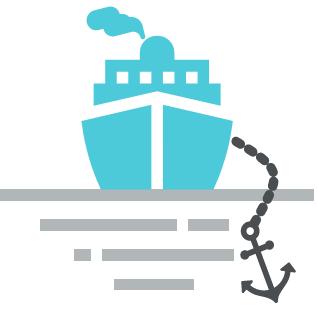“Seagull CES marine test online about Thermal Insulation” (Crew Evaluation Test) will help marine specialists in preparation to exams for getting certificate of confidence.
This test contains 23 questions. Mode “Practice” and “Exam” have one difference – in “Exam” mode you can’t ask the computer to show you the right answer.
Start test
How often are inspections of void spaces normally carried out?
Every 6 months.
Once a year.
Once every 5 years.
Whenever the need arises.
Next question
If closed moulds are used for in-situ insulation, the filling volume is not to exceed:
60 liters pr. filling.
120 liters pr. filling.
200 liters pr. filling.
300 liters pr. filling.
Next question
Is it necessary to refill cavities that are filled with perlit?
Yes, within one year after the vessel has been taken into service, and then at regular intervals.
No, it is not necessary to refill.
Only if the perlit has been soaked with water.
Only if a tank has been damaged.
Next question
The cellular plastics insulation contracts approximately:
2,5 times more than aluminium and 5 times more than Nickel Steel at -163 °C.
0,5 times more than aluminium and 2 times more than Nickel Steel at -163 °C.
0,25 times more than aluminium and 2 times more than Nickel Steel at -163 °C.
Equal to aluminium and Nickel Steel at -163 °C.
Next question
What are some of the indicators of thermal loss:
Discoloration of the vapour barrier.
Ice or humidity on the surface of the insulation.
Bumps or irregular surface on the insulation.
Next question
What is important to keep in mind about U-profiles that are used on pipes supports?
That they should be fastened tightly around the pipe.
That they must not be fastened against the pipe.
That they should only allow movement on the lateral axis.
That they must be made of a flexible material to protect against stress.
Next question
What is the atmospheric content of oxygen that is required for entry?
12 %.
14 %.
21 %.
24,5 %.
Next question
What is the insulation secured with in order to reduce stress when using the spiral generation system:
A stainless steel band.
Bolts made of a material with low thermal conductivity.
Self-sealing rivets.
A rubber buffer support.
Next question
What is the maximum allowable LEL content for permitting entry when entering void spaces?
1 %.
2,8 %.
9 %.
12 %.
Next question
What is the most common type of insulation material on board gas tankers today?
Mineral wool.
Cork.
Cellular glass.
Cellular plastics.
Next question
What must you check before installing new insulation?
The materials being used are of the exact same type as the original insulation.
That all surfaces are cleaned and repainted.
That all cooling systems are functioning properly.
The steel has been inspected and treated for corrosion and pitting.
Next question
What must you check before personnel are allowed to enter void spaces?
The level of oxygen and contaminants are within safe limits.
The space is vented while personnel remain inside.
A rescue plan has been made.
Next question
What should you do if the elastic bellow between the hatch opening and tank on a cylindrical cargo tank should crack?
Patch it with approved mastic filler.
Repair it with an elastic filler and seal it off with a vapour barrier.
Replace it.
Remove it.
Next question
When insulating straight line pipes it is important that each layer is:
Secured with externally mounted straps or pop rivets.
Separated by a moisture barrier.
Parallel to the previous layer.
Staggered at 180°.
Next question
Where will you find information about emergency procedures for a specific cargo?
On the ship’s cargo manifest.
On the cargo tanks labelling.
On the ship’s emergency plan.
On the cargo data sheet.
Next question
Where would you use polyurethane foam at a density of 150-160 kg/m3?
At pipe connections mounted on deck.
At straight line pipe support points.
Between segments to compensate for thermal variation.
At circumference joints on pipe bends.
Next question
Which of the following has highest diffusion resistance?
Polyurethane foam.
Air.
Mineral wool.
Perlit.
Next question
Which of the following is NOT a requirement of insulation used on pipes and containers?
It should prevent heat transfer.
It should prevent gas leakages.
It should prevent water leakage.
It should provide external protection of the insulation.
Next question
Which of the following properties are needed to fulfil the requirements set for vapour and physical protection?
Prevent moisture transport.
Provide physical strength.
Provide adequate fire protection.
Provide necessary flexibility.
Next question
Which of these is the most common way to reduce tank pressure on a LNG tanker?
To use the gas as fuel.
To discharge the gas into the atmosphere.
To transfer the pressure over to another tank.
To let the pressure escape through the safety valves.
Next question
Which type of material is normally used in the construction of a cargo tank designed for transporting LPG at atmospheric pressure?
9 % Nickel steel.
Aluminium.
Carbon-Manganese steel.
Stainless steel.
Next question
Why do we insulate cargo tanks and other components?
To save fuel.
To prevent heat flow in the cargo, and to protect the ship’s bunker tanks.
To protect the crewmembers.
To prevent heat flow into the cargo and to protect the ship’s structure.
Next question
Why does the formation of ice along the hatch frame on the deck tank require reinsulation?
It can cause corrosion.
It can cause loss of cargo.
It can cause the hull structure to become brittle.
It can cause the cooling plants to overload.
Show result
* In some questions may be more, than one right answer.

“CES test” finished! Your result:
